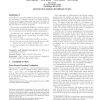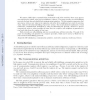529 search results - page 19 / 106 » A Fair Non-repudiation Protocol |
PODC
2004
ACM
14 years 1 months ago
2004
ACM
Secure function evaluation (SFE) enables a group of players, by themselves, to evaluate a function on private inputs as securely as if a trusted third party had done it for them. ...
OPODIS
2000
13 years 9 months ago
2000
We assume a link-register communication model under read/write atomicity, where every process can read from but cannot write into its neighbours' registers. The paper present...
SIGCOMM
1999
ACM
13 years 12 months ago
1999
ACM
Many de nitions of fairness for multicast networks assume that sessions are single-rate, requiring that each multicast session transmits data to all of its receivers at the same r...
SP
2007
IEEE
14 years 1 months ago
2007
IEEE
An electronic cash (e-cash) scheme lets a user withdraw money from a bank and then spend it anonymously. E-cash can be used only if it can be securely and fairly exchanged for ele...
TCC
2009
Springer
14 years 8 months ago
2009
Springer
Gordon et al. recently showed that certain (non-trivial) functions can be computed with complete fairness in the two-party setting. Motivated by their results, we initiate a study...


